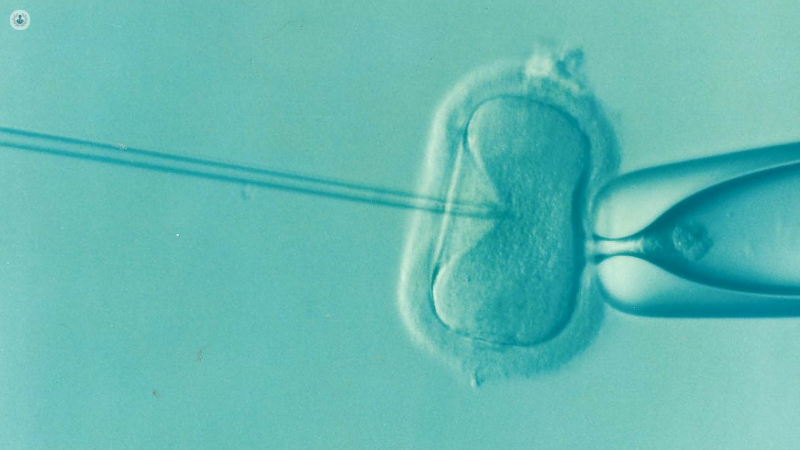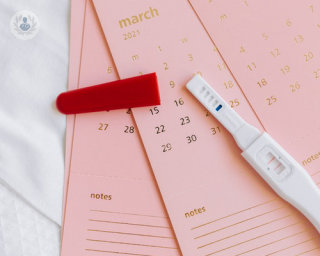What are fertility tests?
If you have been trying to conceive for over a year but have been unsuccessful, it is recommended to have some tests to determine your fertility. These tests can then indicate whether assisted conception measures will help to achieve pregnancy. Fertility tests are carried out on both women and men.

What do fertility tests consist of?
Fertility tests will usually begin by confirming the following:
- How long you have been trying to conceive for
- Whether or not you have had previous pregnancies, miscarriages or abortions
- How often you have been having unprotected sex
- How long since you stopped contraception
- Your medical history (for women, a history of their menstruation)
- What medications you take
- Your lifestyle
You will also have a thorough physical examination to rule out infections, fibroids or endometriosis. A physical examination of men will rule out any testicle lumps or other physical abnormalities.
Women will undergo the following tests:
- Chlamydia test – this STI can affect fertility and may not show symptoms.
- Blood tests – to assess hormone levels.
- Ultrasound scan – to assess the reproductive system and to check for any abnormalities.
- X-ray – to assess the uterus and fallopian tubes using a contrast fluid to check for any blockages.
Men will have the following tests:
- Chlamydia test – can affect male fertility.
- Semen analysis – to assess sperm count and if they move properly.
Why are fertility tests needed?
Fertility tests are needed to determine why a couple who have tried for at least year to conceive have been unsuccessful.
Preparation for fertility tests:
Depending on the fertility test being carried out, the preparation varies. In each case, the specialist will indicate what care should be taken.
Meaning of abnormal results:
Abnormal results may indicate the following:
- Low sperm count
- Sperm that do not move properly
- Blockage of the fallopian tube
- Endometriosis
- Fibroids
- PCOS ( polycystic ovary syndrome)
- Epididymal blockage (blocked tube in the testicles)
A fertility specialist or obstetrician-gynaecologist works to treat fertility issues.
11-13-2012 11-02-2023Fertility test
Dr Irfana Koita - Fertility specialist
Created on: 11-13-2012
Updated on: 11-02-2023
Edited by: Aoife Maguire
What are fertility tests?
If you have been trying to conceive for over a year but have been unsuccessful, it is recommended to have some tests to determine your fertility. These tests can then indicate whether assisted conception measures will help to achieve pregnancy. Fertility tests are carried out on both women and men.

What do fertility tests consist of?
Fertility tests will usually begin by confirming the following:
- How long you have been trying to conceive for
- Whether or not you have had previous pregnancies, miscarriages or abortions
- How often you have been having unprotected sex
- How long since you stopped contraception
- Your medical history (for women, a history of their menstruation)
- What medications you take
- Your lifestyle
You will also have a thorough physical examination to rule out infections, fibroids or endometriosis. A physical examination of men will rule out any testicle lumps or other physical abnormalities.
Women will undergo the following tests:
- Chlamydia test – this STI can affect fertility and may not show symptoms.
- Blood tests – to assess hormone levels.
- Ultrasound scan – to assess the reproductive system and to check for any abnormalities.
- X-ray – to assess the uterus and fallopian tubes using a contrast fluid to check for any blockages.
Men will have the following tests:
- Chlamydia test – can affect male fertility.
- Semen analysis – to assess sperm count and if they move properly.
Why are fertility tests needed?
Fertility tests are needed to determine why a couple who have tried for at least year to conceive have been unsuccessful.
Preparation for fertility tests:
Depending on the fertility test being carried out, the preparation varies. In each case, the specialist will indicate what care should be taken.
Meaning of abnormal results:
Abnormal results may indicate the following:
- Low sperm count
- Sperm that do not move properly
- Blockage of the fallopian tube
- Endometriosis
- Fibroids
- PCOS ( polycystic ovary syndrome)
- Epididymal blockage (blocked tube in the testicles)
A fertility specialist or obstetrician-gynaecologist works to treat fertility issues.


How common is infertility?
By Mr Parijat Bhattacharjee
2024-12-21
As a species, human beings are much less fertile than most other species. Our relatively low reproductive rate can sometimes cause couples to worry that they have fertility problems. But how common is true infertility in people? What can be done about it? Top gynaecologist and fertility specialist Mr Parijat Bhattacharjee tells all: See more


What is sperm DNA damage and how can it affect male fertility?
By Mr David Ogutu
2024-12-20
Trying for a baby can be a stressful process for couples, and it is important to find the reasons behind infertility problems. Here, leading obstetrician and gynaecologist, Mr David Ogutu, explains sperm DNA damage, and how it can be treated in a fertility clinic like his. See more


Do you know how many eggs you have? All you need to know about ovarian reserve and fertility
By Mr David Ogutu
2024-12-20
Female fertility does not last forever, and many women are fully aware of their biological clocks in terms of their fertility. With reproduction becoming more common in later years of adulthood for many women, assessing fertility can be helpful for women and couples. Mr David Ogutu, a top fertility specialist tells us everything we need to know about ovarian reserve and fertility. See more


Expert advice: Trying for a baby and when to see a specialist
By Professor Rami Wakim
2024-12-20
A better understanding of a woman's ovulation can help couples hoping to conceive to maximise their chances of getting pregnant. In this informative article, leading consultant in reproductive medicine Professor Rami Wakim offers expert insight on how couples can track ovulation to improve the likelihood of conceiving. He also advises on health problems that can complicate the process and when to consult a specialist about fertility problems. See more
Experts in Fertility test
-
Dr Benjamin Abramov
Fertility specialistExpert in:
- Assisted reproductive technology
- Fertility test
- Egg freezing
- Recurrent miscarriage
- Preimplantation Genetic Diagnosis
- Egg donation
-
Mr Michael Ellard
Obstetrics & gynaecologyExpert in:
- In vitro fertilisation (IVF)
- Fertility test
- Egg donation
- Menopause
- Polycystic ovary syndrome (PCOS)
- Miscarriage
-
Mr Denis Tsepov
Obstetrics & gynaecologyExpert in:
- Endometriosis
- Robotic surgery
- Myomectomy
- Hysterectomy
- Menopause
- Fertility test
-
Mr Neale Watson
Obstetrics & gynaecologyExpert in:
- Gynaecological cancer
- Assisted reproductive technology
- Fertility test
- Fertility treatments
- Menstrual disorders
- Infertility
-
Mr Mohan Kumar
Obstetrics & gynaecologyExpert in:
- Endometriosis
- Pelvic pain
- Heavy periods
- Ovarian cyst
- Fibroids
- Fertility test
- See all

The Harley Street Clinic - part of HCA Healthcare
The Harley Street Clinic - part of HCA Healthcare
35 Weymouth Street, London. W1G 8BJ
No existe teléfono en el centro.
By using the telephone number provided by TOP DOCTORS, you automatically agree to let us use your phone number for statistical and commercial purposes. For further information, read our Privacy Policy
Top Doctors

TFP Oxford Fertility
TFP Oxford Fertility
Institute of Reproductive Sciences Oxford Business Park North, OX4 2HW
No existe teléfono en el centro.
By using the telephone number provided by TOP DOCTORS, you automatically agree to let us use your phone number for statistical and commercial purposes. For further information, read our Privacy Policy
Top Doctors

The Princess Grace Hospital - part of HCA Healthcare
The Princess Grace Hospital - part of HCA Healthcare
The Princess Grace Hospital, 42-52 Nottingham Pl, W1U 5NY
No existe teléfono en el centro.
By using the telephone number provided by TOP DOCTORS, you automatically agree to let us use your phone number for statistical and commercial purposes. For further information, read our Privacy Policy
Top Doctors
-
The Harley Street Clinic - part of HCA Healthcare
35 Weymouth Street, London. W1G 8BJ, Central LondonExpert in:
- Cancer
- Head and neck cancer
- Cardiology
- Intensive care
- Diagnostic Imaging
- Women’s health
-
TFP Oxford Fertility
Institute of Reproductive Sciences Oxford Business Park North, OX4 2HW, OxfordExpert in:
- Sperm retrieval
- Egg and embryo freezing
- Prenatal Diagnosis
- Ultrasound
- Genetic testing
- In vitro fertilisation (IVF)
-
The Princess Grace Hospital - part of HCA Healthcare
The Princess Grace Hospital, 42-52 Nottingham Pl, W1U 5NY, Central LondonExpert in:
- Cancer
- General Surgery
- Orthopaedic surgery
- Robotic Surgery
- Intensive care
- Sports Medicine
- See all
- Most viewed diseases, medical tests, and treatments
- Tubal factor infertility
- PGT-A
- Complex endometriosis
- Fertility preservation
- Female infertility
- Ovulatory disorders
- Surrogacy
- PGT-M
- Menopause support
- Pelvic ultrasound








